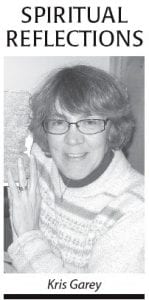This is being written on January 12, and by this afternoon, many in the world will have paused to offer a prayer for the people of Haiti, perhaps even send additional money. 365 days ago the 35 seconds of violent earth tremors brought down buildings—those well built and those thrown together of refuse. Records may never be accurate, but estimates of 250,000 killed, 300,000 injured, and a million homeless are often given.
As this is being written, flooding is carrying away cars, economy, and lives in Australia and Sri Lanka; in Arizona last week, a single person tried to eliminate from life one single individual and ended up killing and injuring many others. And there are other sorrows in your lives, or the lives of those you love…sorrow over illnesses and deaths of children, best friends, and parents.
Seeing all of this, fear can strike deeply. We wonder at what is occurring to ourselves, our families, and people we don’t know except as objects of news cameras. We wonder, “How long, O Lord, how long?” And we aren’t alone. This is one of the most recurring themes in the prayers of the Bible:
“My soul is struck with terror…how long, O Lord?” (Psalm 6)
How long must we sorrow, how long must we languish, “How long, O Lord?” In the Bible and in literature even more ancient, we find these questions have accompanied humans since writing evolved, and no doubt before.
While studies show that many Americans don’t see a need to learn from the past, we learn much from what has been before. We can learn that disasters have come, large and small, to geographical regions and to individual lives. And while we today are filled with dismay that “more hasn’t been done faster” in places like Haiti, we can also learn that far more has been done already than was possible in any previous era.
This doesn’t remove the opportunity we have to increase our doing but is a reminder that we can look back in history and see that generations ago it was almost impossible to know the needs faced by people across the country or globe, and even closer to impossible to aid those suffering.
Still, we wonder, “How long, O Lord?”
In the Bible, God shows us that our questions are not wrong, they are part of being fully human as we live. We are not intended to disregard our fear, nor to turn our fear into condemnation of others. We are intended to reach out to one another and comfort. We are intended to pray and act in whatever small and large ways we can. We are to care for those we know and don’t know. We are intended to cry out with those who languish in pain and sorrow and intended to hold them as they cry out. Whether we can offer them pennies or prayers, we are to do so.
We will not be the solution to all that is wrong…but we will make it more possible for those wounded, depressed, filled with injury and sorrow to continue with life, and to look up and see hope in the actions and concern of others.
People in desperate need often say a prayer like this one: “Do not, O Lord, withhold your mercy from me” (Psalm 40:11).
In a mystery we cannot define, through our prayers, money, words and action we become part of God’s mercy. This doesn’t make life easy, but it includes us in bringing aid to those in need. Today spend 35 seconds asking God, “How might I help, O Lord?”
Each month a member of the Cook County Ministerium will offer Spiritual Reflections. For January, our contributor is Pastor Kris Garey, Trinity Lutheran, Hovland.



Loading Comments